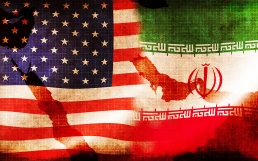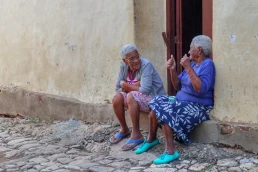By Olivia DiNucci and Ryan Black
In what’s known as northern Minnesota, environmental activists, under Indigenous leadership, are taking action to stop the Line 3 pipeline. But the protests aren’t exclusively about pipelines and tar sands; Line 3 resistors also focus on the link between militarism and the climate crisis.
Line 3 is a tar sands pipeline — currently under construction — violating treaty rights and threatening more than 200 bodies of water with oil spills. It would have a carbon footprint comparable to 50 coal-fired power plants.
Amidst ongoing chaos in Afghanistan, a global pandemic, and climate emergency, the fight to stop Line 3 remains an urgent struggle. Enbridge, the Canadian multinational pipeline corporation behind Line 3, is planning to finish construction by September with crude oil set to flow by the end of 2021.
Resistance to Line 3
The resistance to Line 3 includes a diversity of tactics: direct actions to block Enbridge construction sites; divestment campaigns targeting banks, most notably Wells Fargo and Bank of America; calling on the Army Corps of Engineers to revoke the permits and do an environmental impact assessment; and urging President Biden to use executive action to cancel Line 3 like he did the Keystone XL pipeline.
The police response towards water protectors has been, as expected, heavy handed. Nonviolent direct actions along the 350-plus miles of pipeline have resulted in more than 700 arrests to date, with water protector bails being increased and charges being raised to felony theft. Moreover, police brutality has escalated to include the use of tear gas, rubber-coated bullets, solitary confinement and pain compliance techniques.
Tania Aubid of the Mille Lacs Band of Lake Superior Chippewa led hundreds of water protectors to the steps of the Army Corps of Engineers in Duluth, Minnesota last week demanding that the Corps revoke the permits and do a full environmental impact review. “They need to start listening to the tribal nations who took care of these lands before all the destruction in the name of ‘progress,’” Aubid said. “My family has been fighting Enbridge and the military for eight years. Ever since they set foot on these lands and they’ve been taking over and saying it’s part of the betterment of the future. In actuality, it’s killing us. You can’t drink oil. You can’t eat money. How is that going to be a healthy, progressive lifestyle?” Dozens of solidarity actions directed at the Army Corps of Engineers have been organized across the country.
Militarism and the Climate Crisis
“How about the largest military in the world decides to fix the planet and fix the mess we made?” Winona LaDuke said to a crowd of 5,000 at an open-air Stop Line 3 benefit concert last week on Lake Superior in Duluth.
LaDuke, of the Bear Clan from the White Earth Nation, is an activist, was twice the Green Party’s vice presidential candidate, and co-authored the book The Militarization of Indian Country. She opened the concert by shedding light on the military-industrial complex and climate crisis. “Most of my life my parents took me to anti-war demonstrations. I’m even opposed to the next war. What was that, $2.2 trillion we just spent in Afghanistan? What we found out is that money and guns can’t buy you love,” she said to a cheering crowd.
Though largely overlooked, the U.S. military is the single largest emitter of fossil fuels in the world, larger than 140 countries combined.
While frontline communities are hit hardest by the climate crisis, others are using their privilege and platform to bring awareness to stopping Line 3 and to pressure those in power to act. John Miller, former U.S. Navy diver who helped search for bodies in the Mississippi River after the I-35W bridge collapse in 2007, returned his Joint Service Commendation Medals to protest the Line 3 oil pipeline. In a speech on August 19, he said: “In 11 years serving in the Navy, I was deployed three times in the Middle East and saw the oil wars fought on foreign shores. A lot of soldiers I worked with have left after understanding the military is being used as corporate terrorism. A lot of them have left but unfortunately some still remain and are still asleep.”
Jaike Spotted Wolf of the Mandan, Hidatsu, Arikara tribes said: “Colonization and imperialism being what they are, America just cannot keep its hands out of and off of other countries and what their resources are. That’s I think the main component of what’s behind and what’s driving all of this resource extraction or that’s compelling us to take troops in many, many numbers into foreign countries and devastate those economies and devastate cultures and leave them completely wrecked to the point they are shells of cities when American forces leave. All for the point of what, power? Of saying we’re the best and exceptional in some way? We’re only exceptional in the way that we love war… and it’s quite honestly disgusting.”
Indigenous Organizers Speak Out About Increased Police Brutality, Surveillance and Repression
Tara Houska, an attorney, former advisor on Native American affairs to Bernie Sanders, and founder of the Giniw Collective, spent seven months on the frontlines of Standing Rock and since has been living at and leading a resistance camp. “They’ve billed over $1.7 million to the Public Safety Escrow Trust, in which Enbridge is dumping millions of dollars to incentivize and encourage police officers to repress, suppress and surveil, harass Indigenous people and our allies that are helping us try to stop this pipeline from happening in our treaty territory,” Houska told Democracy Now. “It is a very clear pattern of aggression and of cooperation, that’s also being enabled by things like the Energy Security Act that has just passed through the House very recently. So, it’s a precedent that is very dangerous, and everyone should be afraid of this, regardless of whether or not they’re engaged in pipeline protest.”
When hundreds of water protectors took over an active Line 3 work site earlier this summer, the state escalated tactics. A helicopter from U.S. Customs and Border Protection was used to issue dispersal orders to the group of activists, holding space at the Inlet Pump Station nearby Park Rapids. The Minnesota multi-agency consortium that’s managing pipeline resistance, known as the Northern Lights Task Force, described the aggression as an effort to “provide the order in a manner that everyone would be able to hear.” In reality, the helicopter circled dangerously low to the ground, dusting the group.
“I have watched my relatives be very brutalized by law enforcement by people who claim to protect us and keep us safe. But one thing that rings true in this movement is that we protect us and we keep us safe,” said Taysha Martineau of the Fond du Lac tribe and founder of Camp Migizi. “As BIPoC people, the core of our main issues are colonialism and white supremacy. Whether it’s police or pipelines, when BIPoC take a stand together, they no longer have a neck to kneel on. It speaks to the importance that all oppression is intertwined.” The camp community that counters the surveillance and militarized scenes playing out against water protectors “is not about just the pipeline — Indigenous resistance has been raging for 500-plus years — it’s about the roots that we are building together now.”
>> TAKE ACTION BELOW <<
Recent Posts
The Iranian Trap: Neither Military Action Nor Nuclear Negotiations Can Solve Trump’s (and Israel’s) Conundrum
February 16, 2026
Take Action Now After a failed regime-change strategy and an increasingly risky military buildup, the Trump administration turns back to nuclear…
Suffocating an Island: What the U.S. Blockade Is Doing to Cuba
February 16, 2026
Take Action Now Electric motorcycles are Cuba’s response to the fuel crisis.By Medea Benjamin Marta Jiménez, a hairdresser in Cuba’s eastern city…
For Trump and Rubio, Colonizing Cuba Is Not About Freedom—It’s About Their Own Egos
February 15, 2026
Take Action Now For Trump, regime change in Cuba will cement his legacy. For Rubio, it will mark the culmination of his childhood dream. In their…
Trump’s Concentration Camp Build-Out Includes Nearly $40 Billion for Warehouse Conversions
February 14, 2026
Take Action Now “Germany’s concentration camps didn’t start as instruments of mass murder, and neither have ours,” wrote talk show host Thom…




